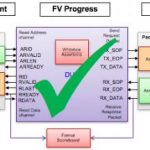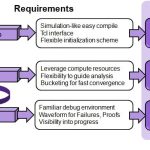Siemens recently released a white paper on a methodology to enhance test coverage for designs with tight DPPM requirements. I confess when I first skimmed the paper, I thought this was another spin on fault simulation for ASIL A-D qualification, but I was corrected and now agree that while there are some conceptual similarities… Read More
Tag: coverage
A Recipe for Performance Optimization in Arm-Based Systems
Around the mid-2000’s the performance component of Moore’s Law started to tail off. That slack was nicely picked up by architecture improvements which continue to march forward but add a new layer of complexity in performance optimization and verification. Nick Heaton (Distinguished Engineer and Verification Architect at… Read More
Qualcomm Insights into Unreachability Analysis
Unreachability (UNR) analysis, finding and definitively proving that certain states in a design cannot possibly be covered in testing, should be a wildly popular component in all verification plans. When the coverage needle stubbornly refuses to move, where should you focus testing creativity while avoiding provably untestable… Read More
Coverage Analysis in Questa Visualizer
Coverage analysis is how you answer the question “have I tested enough?” You need some way to quantify the completeness of our testing; coverage is how you do that. Right out of the gate this is a bit deceptive. To truly cover a design our tests would need to cover every accessible state and state transition. The complexity of that task… Read More
Hybrid Verification for Deep Sequential Convergence
I’m always curious to learn what might be new in clock domain crossing (CDC) verification, having dabbled in this area in my past. It’s an arcane but important field, the sort of thing that if missed can put you out of business, but otherwise only a limited number of people want to think about it to any depth.
The core issue is something… Read More
How Good is Your Testbench?
I’ve always been intrigued by Synopsys’ Certitude technology. It’s a novel approach to the eternal problem of how to get better coverage in verification. For a design of any reasonable complexity, the state-space you would have to cover to exhaustively consider all possible behaviors is vastly larger than you could ever possibly… Read More
An Advanced-User View of Applied Formal
Thanks to my growing involvement in formal (at least in writing about it), I was happy to accept an invite to this year’s Oski DVCon dinner / Formal Leadership Summit. In addition to Oski folks and Brian Bailey (an esteemed colleague at another blog site, to steal a Frank Schirrmeister line), a lively group of formal users attended… Read More
Quantifying Formal Coverage
Verification coverage is a tricky concept. Ideally a definition would measure against how many paths were tested of every possible path through the complete state graph, but that goal is unimaginably out of reach for any typical design. Instead we fall back on proxies for completeness, like hitting every line in the code. This … Read More
Webinar: Getting to Formal Coverage
Facing rapidly growing challenges in getting to respectable coverage, designers have been turning more and more to formal verification, not just to plug gaps but increasingly to take over verification of significant components of the testplan. Which is great, but at the end of the day any approach to verification must be measured… Read More
Bringing Formal Verification into Mainstream
Formal verification can provide a large productivity gain in discovering, analyzing, and debugging complex problems buried deep in a design, which may be suspected but not clearly visible or identifiable by other verification methods. However, use of formal verification methods hasn’t been common due to its perceived complexity… Read More










